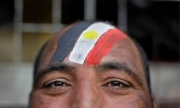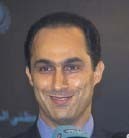Page under construction
Egyptian Revolution of 2011
2011 Egyptian revolution
Wikipedia
The 2011 Egyptian revolution took place following a popular uprising that began on 25 January 2011. The uprising, in which the participants placed emphasis on the
peaceful nature of the struggle, mainly comprised a campaign of civil resistance, which featured a series of demonstrations, marches, acts of civil disobedience, and labor strikes. Millions of
protesters from a variety of socioeconomic and religious backgrounds demanded the overthrow of the regime of Egyptian President Hosni Mubarak. Despite being predominantly peaceful in nature, the
revolution was not without violent clashes between security forces and protesters. The campaign took place in Cairo, Alexandria, and in other cities in Egypt, following the Tunisian Revolution that
saw the overthrow of the long-time Tunisian president. On 11 February, following weeks of determined popular protest and pressure, Mubarak resigned from office. Read more
Lara Logan breaks silence on Cairo assault
Lara Logan breaks silence on Cairo assault
CBS News 60 Minutes
CBS News foreign correspondent Lara Logan talks to Scott Pelley about sexual assault, her rescue and recovery
The night of Feb. 11, the Egyptian dictatorship of Hosni Mubarak was falling. More than 100,000 people filled Cairo's Tahrir Square in wild celebration. Among those in the crowd was our "60 Minutes" colleague, correspondent Lara Logan.
Lara, a native of South Africa, is an experienced war reporter, but Tahrir Square became her most hazardous assignment.
After the assault: Lara Logan comes home
The "60 Minutes" correspondent on her life since the attack, new fears as a reporter, and the people who helped restore her dignity.
During the revolution, dozens of reporters were assaulted, often by agents of the regime. On the night of the 11th, a mob turned on Lara and her "60 Minutes" team and singled her out in a violent sexual assault. Since then, Lara has been recuperating with her husband and two children.
Now, she is returning to work and she has decided to tell the story of what happened - just once - on "60 Minutes."
She's speaking out, she tells us, to add her voice to those who confront sexual violence; to break what she calls the "code of silence."
Lara arrived in Cairo at a moment of triumph for Egypt. She didn't imagine, in the hours before midnight, she would be fighting for her life.
Lara Logan: When we drove from the airport into Cairo that night, moments after Mubarak had stepped down, it was unbelievable. It was like unleashing a champagne cork on Egypt.
Logan: I'm anxious to get to the square. I've got to be there because this is a moment in history that you don't want to miss.
Scott Pelley: What does it look like?
Logan: It looks like a party.
Logan: It's a roar of sound because everyone is so excited and they are singing songs of the revolution and shouting slogans.
Logan: And everybody is, you know, very physical, so you are being jostled and pushed. And sometimes people get closer. And my guys are very protective of me, you know, they want to keep people at bay. It was impossible not to get caught up in the moment, which was real moment of celebration.
Pelley: Tell me about your team.
Logan: Our producer was Max McClellan. My cameraman was Richard Butler.
Logan: We had a local fixer Bahaa, whose job was to bridge the divide for us as foreigners.
Logan: We had two Egyptian drivers with us who were purely there to act as security and bodyguards. And then we had a security person, Ray, who's done security all over the world.
She reported, without a hint of trouble, for more than an hour.
Pelley: And what happened then?
Logan: Our camera battery went down. And we had to stop for a moment. And suddenly Bahaa looks at me and says, "We've gotta get out of here."
Pelley: He's Egyptian. He speaks Arabic. And he can hear what the crowd is saying?
Logan: Yes.
Pelley: He understands what no one else in the crew understands?
Logan: That's right. I was told later that they were saying "Let's take her pants off." And it's like suddenly, before I even know what's happening, I feel hands grabbing my breasts, grabbing my crotch, grabbing me from behind. I mean - and it's not one person and then it stops - it's like one person and another person and another person. And I know Ray is right there, and he's grabbing at me and screaming, "Lara hold onto me, hold onto me."
As she was pulled into the frenzy, the camera recorded Lara's shout: "Stop!" Read more
Produced by Robert Anderson
19 Americans in Egypt Face Trial in Funding Inquiry
19 Americans in Egypt Face Trial in Inquiry Over Funding
The New York Times
By DAVID D. KIRKPATRICK
February 5, 2012
CAIRO — Egyptian authorities have referred 19 Americans and two dozen others to criminal trials, justice ministry officials said Sunday, as part of a politically charged
investigation into the foreign financing of nonprofit groups that has shaken the 30-year alliance between the United States and Egypt.
The referral flies in the face of increasingly urgent warnings to Egypt’s military rulers from President Obama, cabinet officials and senior Congressional leaders that
the investigation could jeopardize $1.55 billion in expected American aid this year, including $1.3 billion for the military.
On Saturday, Secretary of State Hillary Rodham Clinton said she personally warned the Egyptian foreign minister, Mohammed Amr, during a security conference in Munich. "We
are very clear that there are problems that arise from this situation that can impact all the rest of our relationship with Egypt," Mrs. Clinton told reporters there.
Congress requires that before the aid can be released, the State Department must certify that Egypt is making progress toward democracy, including respecting the
independence of the civil society groups under investigation. President Obama has personally told Mr. Tantawi that the investigation represents a failure to meet those criteria. Read more
Naked Capitalism explains the Egyptian Revolution, Bank of America connection
The Egyptian Labor Uprising Against Rubinites
Naked Capitalism
by Matt Stoller
February 14, 2011
By Matt Stoller, the former Senior Policy Advisor for Rep. Alan Grayson. His Twitter feed is @matthewstoller
Via Wikileaks, we learned that the son of the former President of Egypt, Gamal Mubarak, had an interesting conversation in 2009 with Senator Joe Lieberman
on the banking crisis. Gamal is a key figure in the forces buffeting Egypt, global forces of labor arbitrage, torture, and financial corruption. Gamal believed that the bailouts of the banks weren’t
big enough – "you need to inject even more money into the system than you have". Gamal, a former investment banker trained at Bank of America, helped craft Egypt’s industrial policy earlier in the decade.
wiki cable, Sen Lieberman, Gamal Mubarak[...]
Adobe Acrobat document [47.9 KB]
Our purpose is to improve Egyptians’ living standards. We have a three-pronged plan to achieve this: favoring Egypt’s insertion into the global economy, reducing the
state’s role in the economy, and giving the private sector greater freedom.
Deregulation, globalization, and privatization. This should be a familiar American recipe, commonly associated with former Treasury Secretary and Goldman Sachs chief Bob Rubin. That Rubinite rhetoric
has been adopted by the children of strongmen shows the influence of Davos, the global annual conference of power brokers. Gamal, far more polished than his father, understood that the profit and
power for his family lay in cooperating with foreign investors to squeeze labor as hard as possible.
This strategy was targeted at the global labor arbitrage going on since the 1970s, with Egypt’s role as one cheap labor in-sourcer. It’s no surprise that the Mubarak family has $40-70B stashed away
in the global tax safe havens coddling the superrich. This wealth was extracted from the youth and women in Egypt’s new factories making low-cost goods for export. This is why the revolution was
spearheaded by youth and women, and why the nationalist business elite, with its deep ties to the military, sided with the protesters. Mubarak’s inner circle aligned themselves with international
investors and set themselves against domestic business and military interests. Read more





































































































































